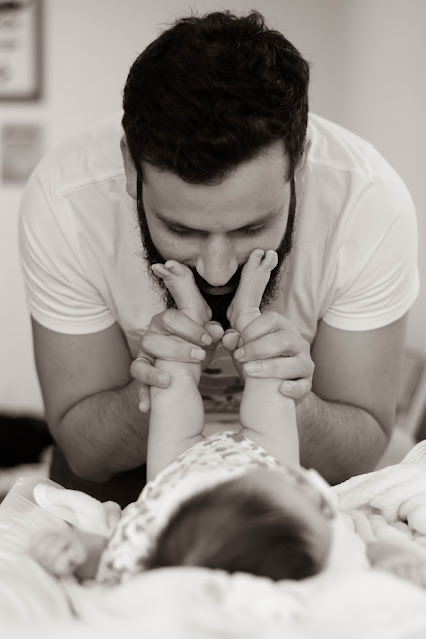The issue of post-natal depression in women is very real and understandable, but let’s not forget the dads who may also need support. As well as supporting their partners, a change in relationship dynamics and getting used to a completely new routine, many men feel the pressure of money worries, too. Tommy’s, a UK pregnancy charity, have stated that It’s thought that one in 10 men may suffer from parental depression.
What are the Symptoms of Parental Depression?
When men feel the weight of responsibility for their new family, they can often suffer from depression post pregnancy. There are many symptoms that you need to look out for if you suspect you may be suffering from post pregnancy stress:
● Feeling of hopelessness and sadness
● Exhaustion or numbness
● Lack of motivation
● Feeling unable to cope
● Feeling guilty for not being happy or for not coping
● Worrying that you don’t love your baby enough
● Feeling easily irritated
● Crying or feeling like crying more than usual
● Lack of appetite
● Binge eating
● Difficulty sleeping
● Disinterest in your partner and/or baby
● Anxiety and/or panic attacks
● Unable to make decisions
● Thoughts of harming yourself or your baby
● Thinking about death
You may only have some of these symptoms or you may feel that something just isn’t quite right. Even if it’s not on this list, you should talk to someone about how you are feeling.
What are the physical symptoms of Stress?
Stress can cause many different symptoms either physically, mentally and also how you behave. It's not always easy to recognise stress until there is a noticeable physical change.
Hair loss: It is a well-known phenomena that women often lose hair after childbirth. However, for some men, the first signs that stress may be having an impact on the body can be increased hair loss also. It is one of the more common reasons for hair loss in men under 25. During stressful episodes, such as after the birth of a child, the growth phase may stop altogether, which will lead to a higher number of hairs shedding. If you have concerns over hair loss there are a few options, including finasteride, minoxidil, steroid injections or hair transplant.
Stomach issues: stress can upset the delicate balance of digestion. It can slow down digestion, cause bloating, pain and constipation. Conversely, it can cause diarrhoea, too. Some people lose their appetite completely and worsen digestive conditions such as stomach ulcers and irritable bowel syndrome.
Headaches or dizziness: Lack of sleep after the birth of a child, for either the mother or the father, can induce headaches or dizziness. Exercise, meditation, sleep or even acupuncture can offer relief from headaches.
What can I do to Reduce Stress post Pregnancy?
To maintain a positive attitude post there are few things you can do to promote stress relief:
● Eat well: accept any offers of food from family and friends. A casserole left at your front door or a salad from the in-laws shouldn’t be dismissed.
● Exercise: it may be difficult to find the time with a new baby, but even a walk round the park pushing the pram will help. A stroll in a pram also has the added benefit of often sending a fractious baby off to sleep! Of course going to the gym can be a task, but you can always try no-equipment workouts at home.
● Rest: the phrase, ‘sleep when the baby sleeps’ is one often bandied around and for good reason. It may be tempting to cut the grass, vacuum the carpet or catch up on one of the many jobs around the house, but all of that can wait. Sleep improves your brain performance, mood and health and is obviously in short supply with a baby. So take the opportunity whenever you can!
● Avoid alcohol: it may be tempting to mask your feelings for a while by having a few cold beers, however, alcohol is actually a depressant. Initially, alcohol affects the part of the brain associated with inhibition which is why it sometimes makes you feel more relaxed. Unfortunately, the effects of your first drink can be replaced with negative emotions, such as depression, anxiety or even anger.
● Talk: It’s so important to talk! Talk about how you feel, whether it’s with your partner, family or a friend. Seek support from other new dads: you may be surprised to realise you aren’t on your own and they are feeling the same.
● Ask for help: Asking for help isn’t a sign of weakness: it actually means you are doing the right thing for you, your partner and your baby. You are being the best dad you can be.
Being a parent, not just a mother, requires the support of family and friends. The best dads are ones who don’t try to go it alone but instead understand their unique role and the importance of a wider network of support. After the birth of a baby, both the mother and child have several follow-up visits. These visits can be a great time for dads, as well as mums, to make the most of the vast experience of healthcare professionals and ask for advice.
Support for Fathers
The most important thing to remember is that you aren’t alone as a dad in feeling anxious or stressed after having a baby and it's not something to be ashamed of. The first few months after the birth of your baby may feel like they are going on forever and there isn’t a light at the end of the tunnel but there absolutely is! Follow these tips on reducing stress post pregnancy and before you know it, those feelings will be a thing of the past. You may also be able to help other new fathers when they are feeling the same.
*Collaborative post


0 comments